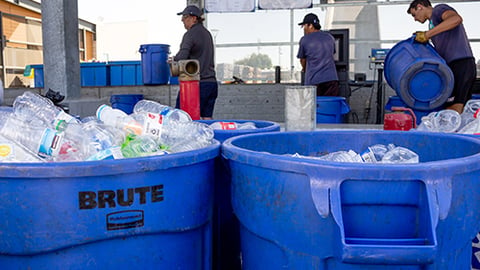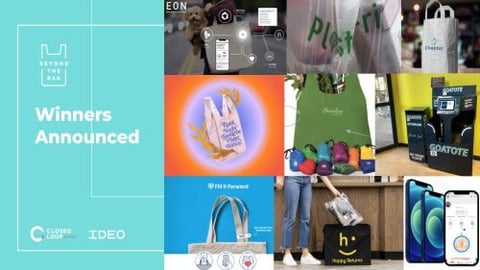Recycling, Reuse Strategies for Today's Retail Climate
With a new administration in the White House making environmental issues a big priority, food retail should expect growing pressure to follow suit from regulators (and consumers). One of the areas where the industry can make a big contribution is helping to eliminate waste through recycling and reusable systems.
Regulatory Action
This year, the Washington D.C.-based Consumer Brands Association is focusing its efforts on advancing recycling solutions that will work within the United States. One big challenge it faces, however, is dealing with what the trade group describes as a “patchwork” system.
“Every single city has its own recycling system,” explains Meghan Stasz, VP, packaging and sustainability at Consumer Brands Association, “so what would be recyclable for one grocery store would be totally different for the same store just across the city lines. That’s confusing to consumers and to businesses. Our big priority for recycling this year is offering solutions that address that underlying patchwork of systems to find ways to improve our infrastructure for recycling.”
Consumer Brands Association has already gotten the ball rolling with its Recycling Leadership Council (RLC). The RLC, a broad coalition of stakeholders, was created last year to determine how the federal government can help play a coordinating role in fixing the nation’s recycling efforts and building a circular economy.
This past February, the RLC unveiled its “Blueprint for America’s Recycling System” to bipartisan members of Congress. The report lays out policy action on how the federal government can be a positive force in modernizing and standardizing the recycling system across the country.
“Having actionable ideas that would make an impact and that would also have broad, wide-ranging industry support is a great place to be so early in the year,” notes Stasz.
She also points out that the federal government’s role is only one piece of a big holistic puzzle when it comes to recycling.
The Washington, D.C.-based Retail Industry Leaders Association agrees. Its Retail Compliance Center emphasizes that retailers have a role to play in supporting the health of the recycling system by creating demand for recycled materials through commitments and procurement strategies.
According to the association’s recent “Retail Trends: The Waste Landscape and Solutions for the Retail Industry” report, customers want to know where material is going and what it’s made into. Retailers can build trust and commitment with consumers through transparent reporting requirements for their waste and recycling programs.
“I think 2021 presents a very real opportunity for massive improvements to recycling,” says Stasz. “Over the past two years, we’ve seen unprecedented stakeholder interest in fixing this problem. This is a bipartisan issue that consumers want, industry wants, and there is political will for, so there’s great opportunity for very real and lasting progress.”
CPG Innovation
Demand for recycled content is growing rapidly, with more than 250 brands and retailers in the United States committing to increase their use of recycled content in products and packaging.
In February, General Mills’ Nature Valley became one of those brands. It launched the first plastic film wrapper designated as Store Drop-Off recyclable by How2Recycle with the brand’s Crunchy granola bar.
According to the “Sustainability 2019” report, from The Hartman Group, based in Bellevue, Wash., 70% of the U.S. population want to decrease plastic waste but don’t know how, yet more than 90% of Americans are within 10 miles of a store drop-off recycling location. That means a potential 295 million people could participate in store drop-off recycling.
“Over the last three years, Nature Valley’s R&D scientists worked in collaboration with packaging partners to develop this wrapper technology, because there was not an existing solution that protected the product and was recyclable,” says Brian Higgins, grain snacks business unit director at Minneapolis-based General Mills. “Now there is, and the goal is to implement the wrapper technology across the brand’s entire portfolio of snacks by 2025 and extend to other General Mills brands and products.”
The wrapper uses new-to-the-category advanced film processing with unique polyethylene polymers. Once recycled, the materials can be used to create new products like synthetic lumber and decking equipment. This new packaging also offers the barrier needed to preserve the product’s freshness and doesn’t compromise the item’s shelf life.
Nature Valley is purposefully not patenting the wrapper, welcoming other food brands to apply the technology to their own product portfolios.
“We’ve removed two key barriers for others to adopt this wrapper technology,” continues Higgins. “The first is the technology — we didn’t have a recyclable packaging option previously. The second is consumer knowledge on store drop-off recycling programs — in March, we’ll be kicking off a campaign to teach consumers about what can be recycled and where to find store drop-off bins near them.”
The newly packaged bars will be available this spring.
Return of the Milkman?
Recycling alone isn’t the only answer to protecting the planet. Replacing one-off disposable products with solutions like reusable and refillable packaging is experiencing an upswing in consumer adoption. This is where Trenton, N.J.-based TerraCycle’s Loop is concentrating its efforts. Loop is a circular e-commerce platform that provides products redesigned for a waste-free shopping experience.
As Loop points out, before the 1950s, products were typically made to be high quality and reusable, and refill models such as the neighborhood milkman were popular.
But we produce and buy more products than we did in the 1950s, the majority of which are sold in single-use packaging — think of that carton of milk — which inevitably becomes waste. Loop is building a global ecosystem for the reuse movement that maintains the convenience and affordability that consumers have come to enjoy with a throwaway lifestyle.
The products available on Loop’s platform are packaged in reusable glass or metal containers and shipped directly to customers in a specially designed tote. The containers are then picked up at no charge, cleaned, refilled and reused to create a circular packaging system.
According to the company, reusing an object saves energy and resources, as the object needs only to be transported and cleaned before it can be cycled again.
Some of the retailers partnering with Loop to offer waste-free shopping include The Kroger Co., European grocer Carrefour, Walgreens and Canadian retailer Loblaw Cos. Ltd.
Reinventing the Plastic Bag
One of the major sustainable initiatives accelerating in retail of late is the search for eco-friendly alternatives to the single-use plastic retail bag.
According to the New York-based Center for the Circular Economy at Closed Loop Partners, the short use (as little as 12 minutes) and long lifespan of the single-use plastic bag have led to rising environmental concerns. With fewer than 10% of the estimated 100 billion plastic bags recycled in the United States, these bags are among the top 10 items polluting beaches and waterways.
Closed Loop Partners’ Consortium to Reinvent the Retail Bag, through its Beyond the Bag Initiative, is a multiyear collaboration across retail sectors that aims to create sustainable and cost-effective retail bag alternatives.
CVS Health, Target and Walmart are founding partners of the consortium. Other partners include Kroger, Dollar General Corp., Albertsons Cos., Hy-Vee, Meijer and Walgreens.
One of the newest partners is Wakefern Food Corp. While its ShopRite banner already offers reusable bags for purchase and provides recycling bins for customers to return used plastic bags, Wakefern saw the consortium as a necessary opportunity to bring important stakeholders together to solve the retail bag challenge.
“Holistic and creative strategies are critical to be able to effectively tackle the complex challenge of plastic waste,” says Robert Zuehlke, manager of corporate social responsibility for Keasbey, N.J.-based Wakefern.
According to Zuehlke, a “better retail bag” entails a number of important facets, including consumer behavior and habits. “Solutions in urban stores may differ from solutions in suburban or rural stores,” he notes, “and solutions at checkout may look different than e-commerce pickup or delivery solutions.”
Last year, the consortium introduced the Beyond the Bag innovation challenge to develop alternatives to the current plastic bag. This past February, it revealed nine winning solutions:
- ChicoBag: A low- to no-cost reusable solution for those prone to forgetfulness.
- Eon: Powering the connected circular bag with CircularID, creating the systems and operations to incentivize circularity.
- SmartC: A smart tag-and-bag system built for the digital generation.
- Domtar: Strong, light and stretchable — a better paper bag.
- Fill it Forward: Consumers give back, track their impact, earn rewards and never forget the bag they already own.
- Goatote: Enabling access to clean, reusable bags no matter where, when or how consumers shop.
- PlasticFri: The company’s Starch-Based Compostable Bag is made from agricultural waste.
- Returnity: Reusable packaging solutions that scale through smart-system deployment.
- Sway: Seaweed-derived replacements for single-use plastic bags.
The consortium will work closely with the winning solutions throughout 2021, supporting design research, prototyping and mentoring toward piloting select solutions in-market.





